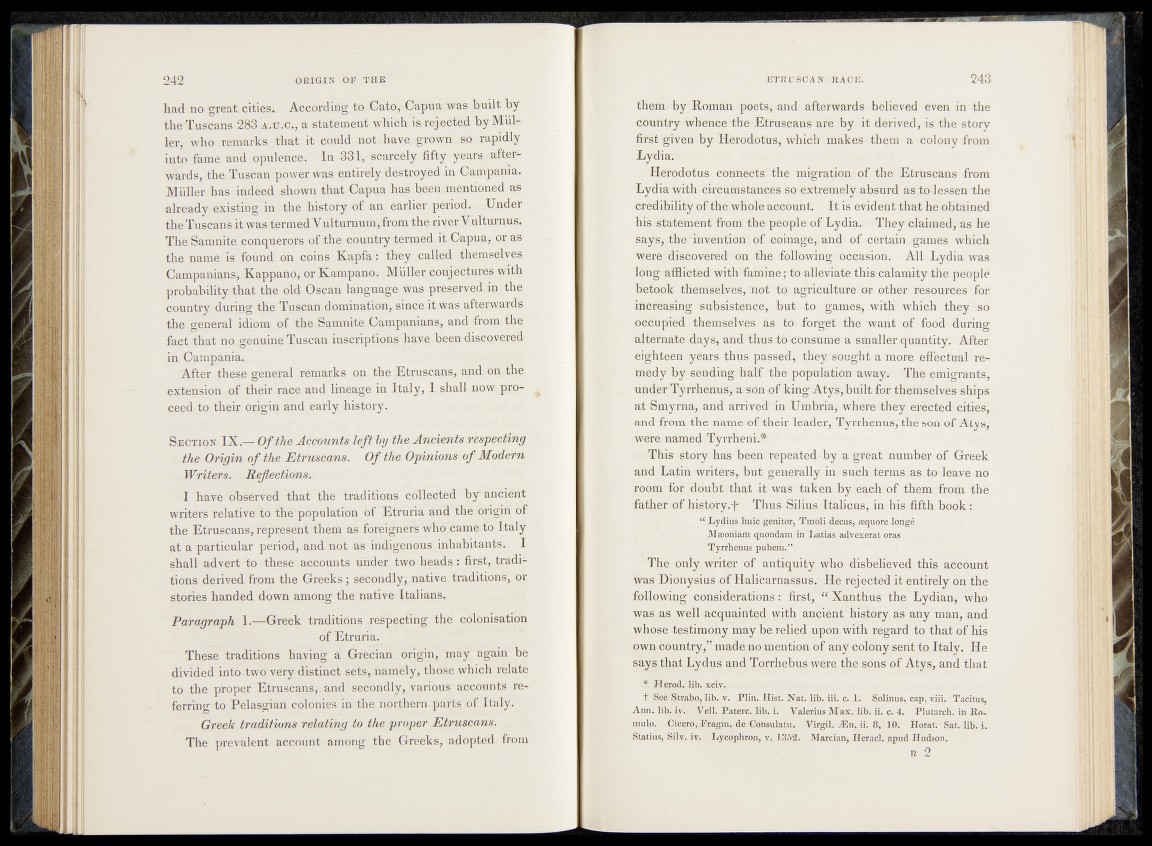
h ad no great cities* Acco rdin g „to Ca to , Capua was b u ilt b y
th e T uscan s 2 8 3 a .u .c., a sta tem en t w h ic h is r ejected b y M uller,
wh o remarks th a t it-e o id d n p t/h a v e 'grown1 so,- rapidly
i|tQ fame and opu len ce . In § 3% fsca r c e ly f if t y yearn < alter,-
w'ards)|the Tuscan power was en tir e ly destroyed ip G&iftpania.
Mfiller ha s in d eed shown th a t Capua has-been mentioned as
a b e a d y e x is tm g T n ith e h isto ry -o f an .earlier period;.*;: U n de r
th e T uscan s it was .termed Vuiturnum-, from the
The'Samni.te conquerors o f th ^ cp u n tr y term.edsii-
th e n am e -is found ©h c o in s K a p f a : they, ca lled ,
Campanians,, Kapp ano , or K am p a n ^ t|M fille reon jp ctu ip s with
probab ility th a t th e o ld Oscan langu a g e, w a s presjryed in th e '
country d u ring th e T uscan domination, sigé.e it w as aftm’.wva-rds
th e general idiom o f th e Samnite Campanians:, and jfrom, th e
fa c t th a t no, .genuine T u scan in sc r ip tion s have been
in Campania.
.A fte r theseigeneral remarks on the ^j^.usêfinSj,,audf.°p the
extension of their Tape and lineage in Italy, I shalh^'w^ftfib
€eed<t© their origin and .early history.^
Section IX.— O f the Accounts left by the Ancients,respecting
the Origin o f the Etruscans. Of the Opinions, o f Modern
Writers. |j Reflections^
I h a te hbsérved th at the tradit’ibns collected'b ^ a n ^ èm
writers relative? to the population of Etruria ana the^^ngih of
the Etruscans, represent them as foreigners who'hamc to l%ly
a t a particular period* and not as indigenous inhabitants. I
shall advert to these accounts [under; two heads : first, traditions
derived from the Greeks; secondly* native: traditions) or
stories handed down among the native Italians.
Paragraph 1.—Greek traditions respecting the .colonisation
of Etruria.
' These traditions having a Grecian origin, may again be
divided into-two very distinct sets, namely, thosewhicn. réi ate
to the proper Etruscans, and secondly, various accounts referring
to Pelasgian colonies in the, horthermpaitó ó f'Italy.1
Greek traditions rekitin'g to the.proper Etruscans.
The prevalent account among the Greeks, adopted from
them by Roman poets, and afterwards believed even in the
country whence ther Etruscans are by it derived, is the story
first given by Herodotus, which makes them a colony from
Lydia. "
Herodotus connects the migration of the - Etruscans from
Lydia with-eircumstances so extremely absurd Us tfpessen the
credibility of’tbfe whole accounts It is’ evident that he obtained-
h i s • state men# frarii'/the people*©! Lydia. They claimed, as he
says,-the 'invention of coinage/and/, ©f(certain games which
Were discovered ®n the following Occasion. All Lydia was
lhtrg afflicted" with famine ; to'alleviate this calamity the people
betook themselves, not to agriculture ov other resources - for
inereafeikg -sdb^isfertceysbut to .games, with \yhich‘ they^so
Occupied tkemsOlVes as to*--forget the want of food' during
alternate day&fundHhus-to consume a smaller quantity: After
.IfehtYen-'iyears thfis.pfissed* theyiSought a more i effectual re-
By ’sending half th&. pop'ulatio'n ^away. - The emigrants,
underTyrrhenus, a^gfoof king Atys,builfcfor themselve&ls’hips
at Smyrna, and arrivefein 'Umbria, &w,here they ei-ected cities
an'd. ff-Om the* name’Of tfafiiri leader, Tyrrhemis,'fhe son of Atys*-
-were' namedTyrrheni.*
This story-has- fe'eem fepeated^by- a greatf number of' Greek
and Latin writers, but-'generally in such terms as tOvleave no
room jibr doubt that it was takenvby Oaeh of'them from the
fathefo\of histpry.f Thus-Silius Italicus, in his fifth book i
“ Lydius huic genitor, Tmoli decus, aequore longe
MsBoniam quondam in Latias advexerat oras
‘Tyrrhenus pubem.”
The only writer of antiquity 'who disbelieved this account
was Diohysiijs of Halicarnassus, He retecied it entirely on the
following considerations: first, “ Xanthus' the Lydian, who
was as well acquainted wjth ancient history as any man, and
whose testimony may be relied upon with regard to that of his
own country,” made no mention of any cplspny sent to Italy, He
s^j|||hat,^jydqs and Torrhebus were the sons^of Atys, and that
* H erod> lib. x.ciy.
f Sj^e Strabo, llj^.y. Plin.t Hist. JSTat. lib* iii. c. 1. Soling, caps viiiv Tacitus,
Ann. lib. iv. Veil. Paterc. lib. i. Valerius Max. lib. ii, c. 4. Plutaip^, ip Ro-
mulo. Cicerdj'Fragm. db'Gdmulatu. Virgil. ii. 8* W . Horat. Sat. lib.V"
Statius,-^Uv. iv. Lycophron, v.. 1352, .Marcian, Heracl. fipud Hudson.
n 2 I